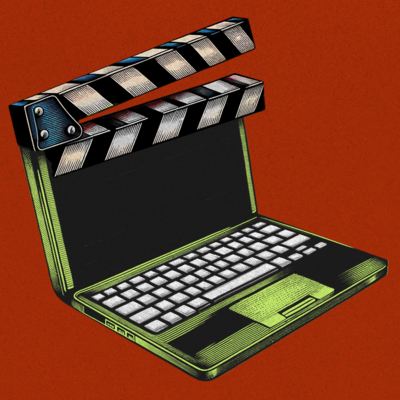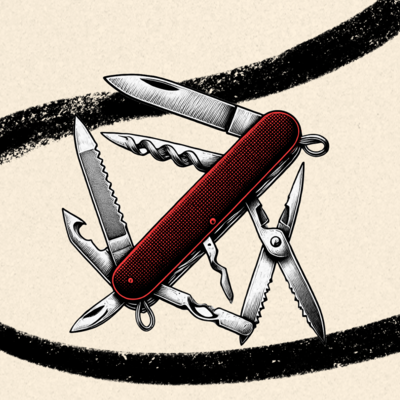
Sponsored By: Artisan AI
Meet Ava, your new AI employee. Ava is a BDR with 10x the skills of a human appointment setter—but for 4 percent of the cost.
- Onboard her with just a 10-minute chat conversation.
- Ava finds relevant leads using her database of 270 million contacts.
- She ghostwrites and sends hyper-personalized emails to thousands of leads per month.
- She autonomously schedule meetings in your calendar .
- Built in email warmup, deliverability optimization, and so much more.
Hire Ava and 10x your leads, meetings, and deals.
My podcast How Do You Use ChatGPT? is climbing the charts! It’s now the #38 podcast on Apple Podcasts and the #41 podcast on Spotify. Thank you to everyone who’s listened. If that’s you, please rate and subscribe on Spotify and Apple so we can reach more people!
I’ve been writing for a few weeks about how ChatGPT has caused me to see reality differently. I’m seeing summaries everywhere, I’ve changed my definition of the intellect, and I’m thinking of myself as a manager of models rather than an individual contributor.
Recently, ChatGPT changed something else.
It has helped me see that English is not one language. Instead, there are many different, invisible versions of English. They all bear a resemblance to one another—like members of a family—but they are all different. And, like people within families of a certain type, they don’t directly talk to one another.
I’m not referring to explicit dialects like Creole. Instead, I’m talking about something more subtle. Let me give you some examples.
Several people who work at Every speak English as a second language. Their spoken English is fluent, but sometimes their writing is a little less so. Their subjects don’t always agree with verbs, prepositions are slightly off, or they reverse word order. It was enough to be understandable but required some copy editing.
Soon after ChatGPT came out, I noticed that their writing became perfect. ChatGPT helped to smooth over the subtle imperfections that give away a non-native English speaker. But it’s not translating from one language into another. Instead, it’s doing so from one version of English into another—dramatically expanding the scope and value of the work that these people can do, with no corresponding increase of effort on their part.
But ChatGPT’s translations go beyond merely fixing slight grammar errors.
My dad came to me recently, as dads do, with an idea for an app to help him better market his business. He could explain it to me over the phone, but the problem was getting it written into a product spec that an engineer could use to build.
Say hello to Ava, an AI business development representative that you can hire today.
With access to a vast database of 270 million contacts, Ava expertly ghostwrites and sends thousands of hyper-personalized emails monthly, ensuring maximum engagement and effectiveness. Ava not only schedules meetings autonomously in your calendar but also promises to multiply your leads, meetings, and deals tenfold, all at just 4 percent of the cost of a human appointment setter.
My dad is an entrepreneur, like me. (Or, more properly, I’m an entrepreneur like him.) He’s always coming up with these ideas. But he’s not in tech. He’s worked in the cemetery and funeral industry for the last 40 years. Normally, I’d have to do this task for him. (Which means it probably wouldn’t get done—or it would, but with a lot of sighing and delays.)
To keep myself in the will and save some time, I told my dad to ask ChatGPT to write it. He typed in his lay description of the app, and with just a few back-and-forth chats, out popped a pretty good product spec. It looked like a product manager had written it.
ChatGPT did a subtle translation from one version of English to another. The version my dad speaks is the one spoken by anyone who uses an iPhone: It’s the vernacular of I want it to do this, and look like that. But product managers and engineers don’t speak that version of English when they are making something. They speak a specialist language with words that carve the world in particular ways that make building things easier—words like MVP and React and backend and SQL database.
These are words that my dad may recognize, but he can’t wield. With ChatGPT, he can. This translation is a powerful way for him to get more done than he ever could previously.
The obvious objection to my “subtle translation” argument is that creating a product spec from a lay explanation is not just an act of translation. It also requires expertise and thinking. My rebuttal is that any good translation usually incorporates these elements. You can never translate text word for word from one language to another, because translation always implies interpretation. Indeed, the philosopher George Steiner argued in his book After Babel that any act of understanding language is translation: “Thus a human being performs an act of translation, in the full sense of the word, when receiving a speech-message from any other human being. Time, distance, disparities in outlook or assumed reference, make this act more or less difficult.”
Also, if ChatGPT can do it, there’s a good chance that the amount of truly new thinking involved is fairly low. This kind of work is mostly transposing from one format to another, where both forms are already fairly well understood.
If you buy the argument, the consequences are massive. How do I know? We’ve been here before.
In the biblical story of Babel, all of the world’s people once spoke the same language. This shared language was a huge aid to their coordination—and their ambition. They became so powerful that they attempted to build a tower to heaven.
God took notice: “Look, they are one people, and they have all one language, and this is only the beginning of what they will do; nothing that they propose to do will now be impossible for them.” (Genesis 11:6 NRSVUE)
He (or she) being a cunning, jealous type reacted in a clever way. Rather than killing them via an apocalypse of fire and lightning, he confused them so that they “[would] not understand one another’s speech.” ( Genesis 11:8 NRSVUE) He scattered them across the earth, thereby limiting their power.
In other words, good translation equals human coordination. And human coordination is the most powerful force on Earth. We can see ChatGPT already beginning to unlock this superpower.
In both of the cases I mentioned above, it created opportunities for people to work together that had previously been impossible, solely for lack of a good translator. Examples like this abound. Think of how many startups aren’t funded because the founders don’t speak the language of venture capital, or how much scientific knowledge goes unused because lay people don’t speak the language of statistics, or how many relationships break up because people speak in different languages of emotion.
Subtle translations allow people from different walks of life, in different parts of the economy, to communicate and coordinate efforts. They break down barriers that would normally take months or years of effort to break down.
I just hope we stay away from building too many towers.
End note: Astute readers will notice that in my previous piece, I described ChatGPT as a summarizer, and in this piece I describe it as a translator. I’m still undecided on which term is most apt, but I think that properly understood, summarizing is a subset of translating. (You can replace almost any sentence that uses “summarize” as the verb with “translate” and it makes sense, but the reverse isn’t true.) So I’m leaning toward using “translator” as a description going forward, but I’m still undecided. I welcome your thoughts!
Find Out What
Comes Next in Tech.
Start your free trial.
New ideas to help you build the future—in your inbox, every day. Trusted by over 75,000 readers.
SubscribeAlready have an account? Sign in
What's included?
-
Unlimited access to our daily essays by Dan Shipper, Evan Armstrong, and a roster of the best tech writers on the internet
-
Full access to an archive of hundreds of in-depth articles
-
-
Priority access and subscriber-only discounts to courses, events, and more
-
Ad-free experience
-
Access to our Discord community
Thanks to our Sponsor: Artisan AI
Imagine having a business development rep who is not only 10x more efficient than the average employee but also costs just 4 percent of their salary.
Meet Ava, an advanced AI BDR that puts lead generation on autopilot. By tapping into a vast 270 million-contact database, she autonomously writes and sends thousands of personalized emails and schedules meetings directly into your calendar, all while optimizing email deliverability—significantly amplifying your leads, meetings, and deal flow.




Comments
Don't have an account? Sign up!
I really talk to GPT-4, Claude, Pi and Bard as friend and collaborator, which leads to much richer and nuanced conversations. Sometimes we solve what I wanted help with. Sometimes not. Sometimes things lead to other ideas that I could never have conceived on my own. I learn topics in history, science, statistics and culture I would never learn on my own. When time permits I try to be open and not rushed into finding a fast solution.
@taushano same! they're such great tools. what do you use Pi for?
Your enthusiasm for ChatGPT is over the top, much like a Taylor Swift fan. And that's what we love about you and your Every enterprise. You always bring forth good points and conversation starters. Your most powerful asset is your subscriber community. Within this community is more depth and expertise than you'll ever find in Google. For example, the whole topic of translators is an area where I worked for 6 years to create credentials, standards, accreditation, and training for the more than 300 languages covered in the U.S. policies for healthcare. Few know that a translator must be provided if you come into the healthcare system and English is not your language. There are many more languages than 300 but that's what's specified in the laws. Here's the biggest thing I learned working with thousands of interpreters. There's a big, big difference between a translator and an interpreter. Translation only touches on trying to find a common place for understanding, but the cultural differences, where your eyes go, what the body movements are, etc. are all cultural and can mean the difference between life and death if you are not understood.
@Georgia@Communicators.com thanks georgia!! this is a wonderful point. i love the idea of the importance of interpretation—something i was trying to allude to as part of a good translation. thanks for sharing! it seems having ChatGPT as a medical interpreter might be useful for people down the road (if it can be made reliable enough)
I think the story of the Tower of Babel is about God's merciful limitations on humanity. Too often great co-ordination can be used for great evil (as in the industrial scale murder of the holocaust). You make it sound like God is the bad one trying to thwart us wonderful souls. It's the other way around. And look how the Tower of Babel ended!
Hey look at what ChatGPT is doing today - I think God just knocked down the tower :)